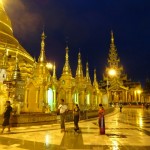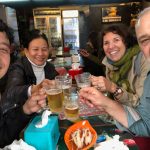If Western democracy doesn’t have what it takes to excite you, finding yourself in Southeast Asia during an election period may reinvigorate your feelings on the process …
With Cambodia’s national elections scheduled for this weekend the country is buzzing with energy of a political tide showing signs of change. People are taking to the streets in large numbers to vocalize their frustrations with the current government in some of the largest political rallies the country has ever seen. There is a slow, but steady movement underway as civic engagement takes off in a country struggling to find its own political identity.
The figurehead behind the unprecedented rallying of the masses is Sam Rainsy, the leader of the Cambodian National Rescue Party — the coalition party created when the Sam Rainsy Party and Human Rights Party joined forces. Today Rainsy, who returned to Cambodia earlier this week after living in exile, visited Siem Reap and was greeted by an enthusiastic crowd of supporters. Currently, he is not allowed to run in the upcoming election, his pardon came to late for him to reenter the country in time to add his name to the ballot. Non the less, the general public see him as a symbol of change.
Rainsy has managed to mobilized the urban youth with his cries for widespread government reform, an end to extreme nepotistic and a promise to address the land grabbing. Where to current leader has used his clout and financial standing to garner support, Rainsy has reached out to the disenfranchised through social media and word of mouth with his pitch of offering an alternative to the status quo.
While the momentum and will for change has obviously taken hold in major cities, residents are realistic that actual reforms aren’t going to come quickly or easily.
Hun Sen is Asia’s longest-serving Prime Minister, maintaining his stranglehold on the country for the last 28 years. He has previously vowed another decade in power and recently threatened a civil war were he not reelected. With allegations of fraud, intimidation tactics and vote buying on behalf of Hun Sen’s Cambodian People’s Party (CPP) the election itself may already seem like a lock. ( The Minister of the Interior Sar Kheng has gone so far as to pledge $25 to pregnant women, $50 towards funeral costs for grieving families and up to $125 to those over 65 suffering from illness requiring hospital treatment in the province of Prey Veng of the CPP wins. )
With Cambodia’s upcoming election approaching, the country’s democratic process is on display, not just for the locals to engage in but also those visiting to see. It is impossible not to take note of the processions of people on motorbikes, sporting their party’s official colour from tip to toe. Equally hard to ignore are the flatbed truck loaded with loud speakers inaudibly blasting party messages in Khmer.
The fact is that whether or not a new party comes into government, Cambodia politics are in a state flux. People are gathering en masse, they are more openly speaking out against human rights abuses and are becoming more committed to seeing a their country change for the better.
More than a race for leadership, this election seems to be unifying the people — bringing them together in the hopes for a better future for all of Cambodia. It will be interesting to see if in the days, months and years following this election whether the people of Cambodia continue to speak out, fight for their rights and follow through on these most recent displays of civic engagement.
After 28 years of unchanging rule and inequitable development, it would see that in Cambodia, times, they are a-changing.
FUN FACTS
- The national assembly has 123 seat — The Cambodian People’s Party currently holds 90, Cambodian National Rescue Party holds 29, Funcinpec Party holds 2.
- There are currently 8 parties running in the election; down from 23 in 2003.
- Some 9.6 million Cambodians are eligible to vote, though voter registration in many areas exceeds 100%
- Until recently, Rainsy was living in exile in France since 2009, when he was convicted of spreading false information and falsifying maps – charges widely believed to be politically motivated. His pardon comes after American lawmakers threatened to cut aid to Cambodia if the elections were not free and fair.





